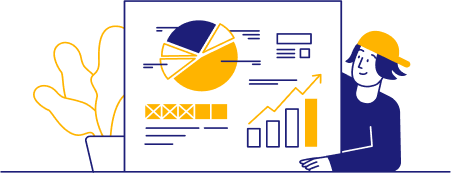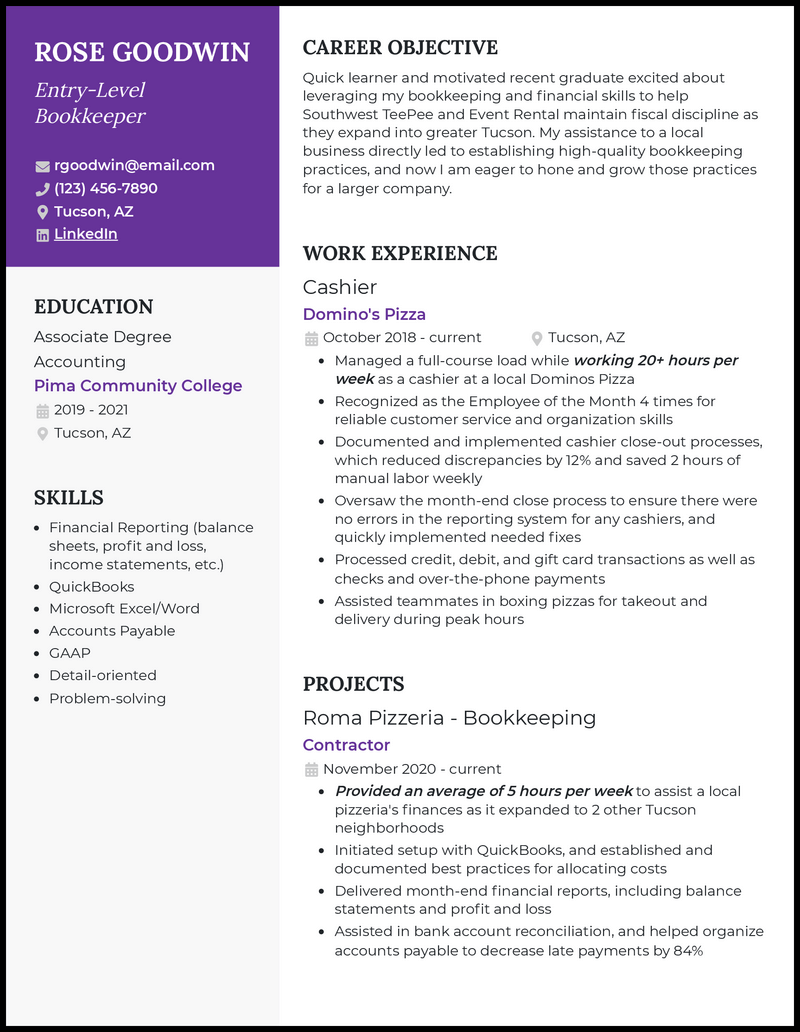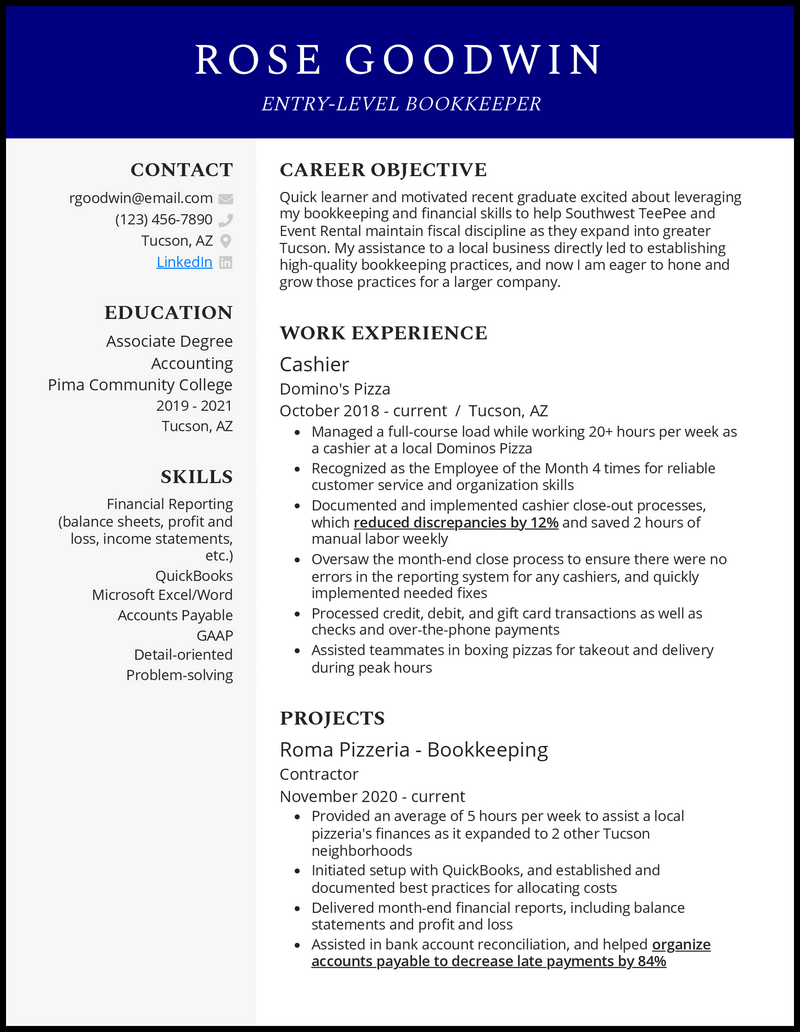You’ve analyzed the data and know you’re great with numbers and completing accurate processes. You’ll be an excellent fit for documenting financial reports and organizing cash receipts while complying with regulations.
Do you have a well-planned resume as you start your bookkeeping career?
It can be challenging to show companies you’ll be the right fit for handling their finances when you’re just starting in the field. You can use our online cover letter generator and entry-level bookkeeper resume examples that are proven to be effective in today’s financial industry to get off to a great start.
Why this resume works
- Out of the 300+ entry-level bookkeeper resumes that made their way to the recruiter’s mailbox, what are the odds that yours will find itself in the “worth a shot” pile? If it showcases a job-relevant project, they’re pretty high in our book.
- Yes, talk about how you assisted a local pizzeria in keeping tabs on their finances and even delivered financial reports at the end of the month. Make sure to quantify the outcomes whenever possible to give weight to your claims.
Related resume examples
What Matters Most: Your Entry-Level Bookkeeper Skills & Work Experience

Bookkeeping comes with its share of regulations, so showing you have the right skills in the hiring process is essential.
Many entry-level candidates can get overwhelmed by this aspect, but there are several skills you can apply here, even if you don’t have much experience. Work you’ve done in other fields can help, such as organizing inventories on retail sales floors or cash-handling as a cashier. Even skills gained from education in accounting or data-based studies are applicable here.
Here are some popular entry-level bookkeeper resume skills that companies look for on resumes.
9 popular entry-level bookkeeper skills
- Data Entry
- Cash Handling
- Payment Processing
- Microsoft Excel
- Regulatory Compliance
- Transaction Reporting
- Team Collaboration
- Quickbooks
- Sales Tax
Sample entry-level bookkeeper work experience bullet points
Bookkeeping candidates without much experience can also struggle when it comes to formulating relevant examples from previous work experience.
There are still plenty of examples you can apply here to impress hiring managers. Think back to tasks you’ve completed with accuracy in previous work experience. Did you compile customer data in accounts? Then that could be listed as an example.
Educational achievements can also be listed as examples of experience. For instance, if you completed an accounting project and received an excellent grade.
Here are a few samples:
- Input customer account data during sales transactions while informing them about the delivery process, with 99% accuracy for 2 years.
- Ran POS systems while processing an average of 120 customer transactions daily with no major cash drawer shortages or overages for 3 years.
- Collaborated with 8 team members while implementing a new Excel spreadsheet system to manage daily profitability metrics 56% more efficiently.
- Took yearly inventory of over 3,000 in-store items, achieving 98.5% accurate data logging for 4 years.
Top 5 Tips for Your Entry-Level Bookkeeper Resume
- Aim for one page in length
- Aim to fill up a complete page of relevant information to the core competencies of bookkeeping. Listing educational experiences in business or accounting, hobbies & interests, or an objective about your financial abilities will help provide enough relevant information.
- Reverse chronological formatting is optimal
- Your abilities in accuracy and key technology needed for the job have likely improved over time. Therefore, leading with your most recent experiences will help hiring managers see you’re proficient in using Quickbooks and processing transitions accurately.
- Measure your impact
- You know better than anyone that measuring data in finance is a crucial aspect of business success. Therefore, aim to include a numerical impact you had for each of the examples on your resume. For instance, how you implemented Excel spreadsheets to reduce compliance errors on transaction filing by 72%.
- Proofread for accuracy
- Hiring managers will want to ensure you enter data accurately, so they’ll look for signs you can achieve that requirement from the get-go. Submitting an accurate and grammatically correct resume shows you have the necessary abilities.
- Keep it organized
- Financial hiring managers review resumes quickly, so an organized template will make a great first impression. Think of it as if you were creating a spreadsheet of financial information. Your resume should have clear headers, bullet points of key data from your experiences, and easily readable 12-14 point font.
A resume objective is a great idea for bookkeepers without much experience. You could include a few sentences about how you’re a motivated professional with three years of cash-handling experience, ready to apply your payment processing accuracy as a bookkeeper.
You should use a cover letter to portray a thorough overview of your bookkeeping skills and how you’ll fit in with the company. Your cover letter could explain how you ensure accuracy at work, why you want to get into bookkeeping, or your passion for the company’s mission.
Many entry-level candidates benefit from including hobbies & interests to fill in additional relevant information. For instance, if you were the treasurer of your school’s student council, that would be an excellent experience to list, showing previous experience managing finances.








